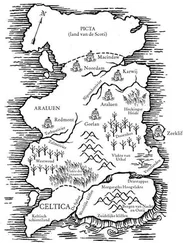“The water is the same,” said my dad.
I stopped. There were a lot of things I might have said to either make the conversation worse or move it off in some different direction, but I liked where it rested as I spun: out in international waters with imaginary lines on their surface that no one could actually see.
You can’t see the hall closet from the dinner table, so I excused myself a couple of minutes early. Mom asked if I’d be back for dessert just as I turned the corner out of sight. When I got back to my room, I slid the rifle and the ammo under my bed, and I put on a Robin Trower record: Bridge of Sighs. I’d bought it in the twenty-five-cent bin with my allowance one week a long time ago, sixth grade maybe. Back then I’d gotten really into it, because I was the only person I knew who’d ever heard of it; nobody listened to Robin Trower. I knew his name from seeing his picture in Hit Parader once or twice. But I’d only ended up with the record by accident, because the name sounded cool and the cover looked weird and I had a dollar in my pocket and it only cost a quarter. I didn’t understand it, really, because without the context of other people’s thoughts on it, it couldn’t really find steady footing in my mind. I wrote his name on my jeans at one point anyway, just to see how it felt: ROBIN TROWER right there on my knee. I outgrew the jeans before it washed out.
In my mind the singer was looking me right in my eyes while he sang. Then he had his hands on my shoulders. Then he was shaking me. I had made up a face and clothes for him, to imagine what he looked like: the album cover was just a swirling white design with words in twisting, curling letters on it, no pictures. I pictured the singer with long hair, big strong hands, wide shoulders, and a blue suit that fit him loosely. I put my head about an inch in front of the speakers, right between them, and I closed my eyes. He sang: “Living in the day of the eagle, the eagle not the dove.” It sounded like he was making up the words as he went along, reacting to a story in his mind as he watched it develop, because he stopped in the middle of the sentence. Right after not the. I liked it, because it was how I felt: not knowing what to say but wanting to say something. Saying something anyway because your mouth just keeps moving and the rhythm is behind you and you can’t stop. The eagle, not the … dove. And then the song went into the slow part, and I began to drift.
Kimmy was out in front of her house when I got there. I heard background music as I drew closer to her; I could picture the street and the lawn and the back of my head, the broader view. Everything on a screen. When she saw me coming, she walked out to the middle of the street and said: “Let’s go”—I wasn’t sure if she put it like that because we were supposed to be getting away from somebody, possibly her parents, so I just went along. The plan had been to study at her place, so I asked what was up, and she said she’d tell me later but right now we should probably go someplace like to the arcade. I never found out why we couldn’t go inside. “I’ll tell you later” is a contingent claim that can be rendered false by any of several moves.
On the way to the arcade she pulled a pack of Marlboro 100s out of her puffy vest and offered me one. Most of my friends smoked now, but I usually didn’t. I took one anyway, and as we walked I took tiny puffs so I wouldn’t cough. Kimmy asked if I was going to be around this summer, and I said, “I’m always around,” which sounded terrible to me, like I didn’t have any real life at all. She was going to Oregon to stay with her mom for at least two weeks. My family had vacation in the summer, too, when Dad took two weeks off work, but we never went anywhere: we stayed home and took long drives, or swam at the hotel pool down the street. It was all right, but every year I felt a little more like I’d never seen anything, like I’d missed out on the stuff my friends kept getting every time school let out.
The arcade was next to a liquor store about six blocks up Monte Vista. It was called Golden Arcade and nobody ever went there. The cool arcade was Starship over in Upland, next to Pic ‘n Save: it had an entrance built to look like a spaceship hatch, and blue track lighting all up and down the walkways inside. It had two levels and six walls, and you could get lost in there, or find things you’d missed every other time you’d gone in. But it would have taken us two hours to walk to Starship, and that was OK, because there were always people there from other schools anyway, and I was always afraid of people my age from other schools. They made me tense. But there was never anybody at Golden Arcade except the woman who worked there. She sat behind a counter listening to a small radio, reading a magazine, waiting for customers who never came. I don’t think she even saw us come through the door.
They didn’t have too many new games there but the ones they had were super clean, and you could see them all from where you stood as soon as you walked in: the arcade was a single rectangular room with games pushed back up against three of the walls and two air hockey tables in the middle. The air hockey tables gave off a loud, cold hum. Kimmy strolled from machine to machine while I got quarters, and then she stopped at Xevious, which is what you play when you get tired of all the popular games. Xevious was mainly gray and soft black, and had music like a lullaby, and everything in it seemed to happen in slow motion. Once when my mom asked me why I liked to play video games I said it was because they were relaxing, and she looked at me like I’d sprouted horns, but Xevious is a very relaxing game. Playing it was like watching flowers bloom. Weird metal airplanes flew over the green and gray background dropping bombs on everything, explosions splashing like soft cymbals, and your only targets were buildings. If there was anybody in the buildings you never saw them go in or out. It was like strafing an abandoned city in an ever-climbing vertical scroll.
We played doubles. I lost. It was a good time, and then after we’d played all our quarters, we went out behind the building to smoke more cigarettes and she asked me if I believed in God. I didn’t have any idea why she was asking but that was something I had always liked about her. She talked about everything.
I was about to make something up about God being an alien consciousness, not even human, because in junior high I worked out a theory about that once during science class. But I had an urge to be as honest with Kimmy as I could. I told her I thought God was just your dad. Like when you grew up and weren’t afraid of your dad anymore you got God instead, and you could make him whatever you wanted.
“You don’t believe in Jesus?” she said.
I said, “I don’t know,” which was kind of true. When people said Jesus it still always sounded to me like it had to mean something special. Different from other words. I knew I didn’t believe what Christians believed, about how if you said the name you would be saved. Saved from what? But still, when anybody said it, when you heard it out loud, something always seemed to happen. A shift in the light. Something about perspective. No matter how quiet they said it or whether they kept talking, it changed everything for a few minutes.
So I knew I believed something about Jesus, but I wasn’t sure what it was, or why she was asking. Kimmy said: “I believe Jesus is Lord,” and I knew this was a signal, a way of opening a path for us into something private and shared. And for a split second, whose limits lie out past the farthest reaches of the universe, I contemplated letting her into the dark, distant corners where Conan grew cruel and lived inside me, where I became a person with the power to blind strangers with a single gesture, where the dull edges of my life grew sharp enough to cut through rock. But instead I kissed her, and she kissed me back, with her tongue. We kept going like this for five or ten minutes and then without looking down she took my right hand in her left and guided it down the front of her jeans.
Читать дальше












